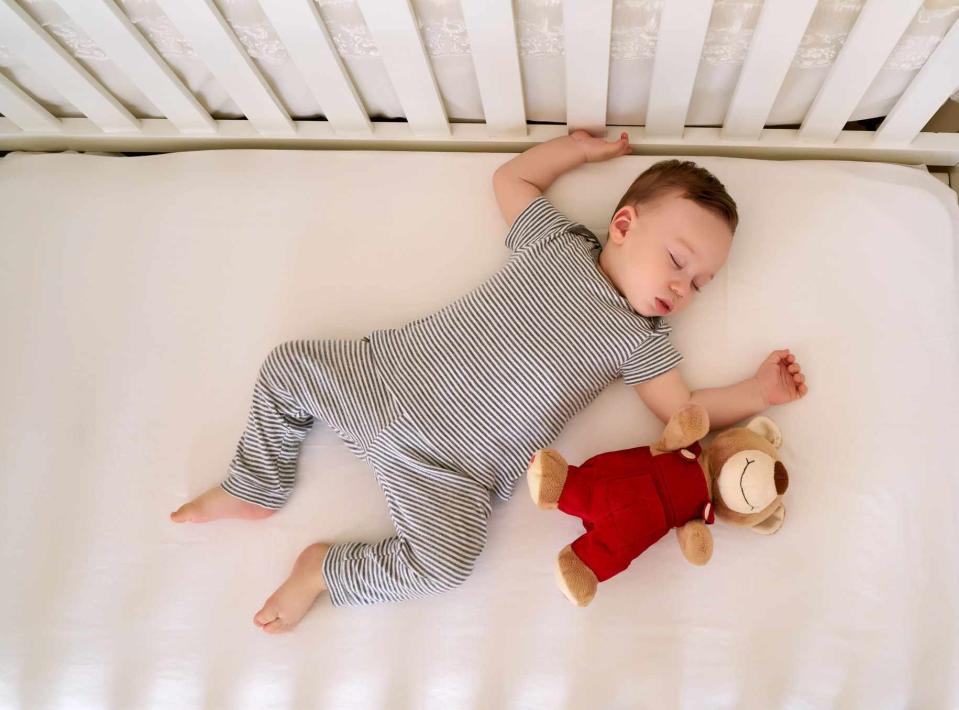9 Tips for Better Sleep for 7- to 12-Month-Olds
What is the best 7-month-old sleep schedule? Is it the same for 1-year-olds? These expert tips will help you easily handle your baby's sleeping habits.

Medically reviewed by Jodi A. Mindell, Ph.D.
If there's one thing you can expect to be constant when it comes to baby sleep, it's constant change. The evolution of baby sleep can be both a good thing and a bad thing. For example, on the upside, if you're going through a hard time, like a sleep regression, chances are it's temporary, and it will change soon.
But on the other hand, the opposite is true too: Just when you think you've got the hang of this baby sleep thing, it can change in an instant.
The good news is that between 7 and 12 months, your baby's sleep will very likely improve. This is due to your baby's brain developing and their circadian rhythm starting to mimic more adult patterns for wake and sleep time.
Even so, many parents wonder, "What is a 7-month-old sleep schedule?" and "Is my 1-year-old getting enough sleep?" Read on to learn what you can do from 7 to 12 months to help your baby get better sleep.
Know How Much Sleep Your Baby Needs

According to the American Academy of Sleep Medicine (AASM), infants 4 to 12 months should get between 12 and 16 hours of sleep in 24 hours. That includes nighttime sleep and naps.
Getting the recommended amount of sleep helps your child with the following:
Attention
Behavior
Learning
Memory
Emotional regulation
Quality of life
Mental and physical health
Nighttime sleep may be around 11 hours at this age, with naps making up the difference. Usually, 7- to 12-month-old babies take two to three naps a day totaling three to five hours.
Related: Here's How Much Sleep Your Kids Should Be Getting
Bond With Your Baby

If you have an established bedtime routine, you'll find that putting your little one to sleep can be a great bonding experience. "As your baby grows, bedtime can be fun as you begin to share quiet songs and games and create family rituals," says Kim West, author of The Sleep Lady's Good Night, Sleep Tight.
Research has found that a consistent bedtime routine has many benefits for babies, including:
Improved sleep
Better language development
Improved literacy
Child emotional and behavioral regulation
Parent-child attachment
Improved family functioning
Focus on activities that will calm your baby and prepare them for sleep, such as a calm bath, reading a book, and snuggling. Avoid anything that might overstimulate them, such as loud music, toys, or TV.
Related: The Best Baby Sleep Tips Ever
Babyproof the Bedroom

As your baby becomes more mobile, you'll need to reevaluate their sleeping environment. So, look around the room for any potential hazards. For example, babies can easily injure themselves on wall hangings, pictures, curtains, and window blind cords.
The Consumer Product Safety Commission recommends the following safety devices to keep your baby safe:
Outlet covers
Anchors to keep furniture from tipping
Corner and edge bumpers to protect a baby's head from sharp corners and objects
Cordless window coverings to prevent strangulation
If you'd like a little help, consider hiring a babyproofing specialist or even inviting a friend over for a set of fresh eyes.
Aim for Naps in the Crib

Along with being the safest place for a baby, ensuring your baby sleeps only in a crib can help improve sleep. "It's important that the crib is used only for sleeping so the baby associates it with bedtime and naptime," says Nadav Traeger, MD, director of pediatric sleep medicine at Maria Fareri Children's Hospital at Westchester Medical Center. "There shouldn't be any playing or eating, and just some light reading, in the crib or bed, when the child gets older."
According to the American Academy of Pediatrics (AAP), make sure your crib is safe by inspecting it for the following:
Slats that are 2 3/8 inches (6 cm) apart to prevent a child's head from becoming entrapped
No decorative cut-outs in the headboard or footboard
Corner posts that are flush with the end panels
All original parts and hardware
No damage to hardware, loose joints, missing parts, or sharp edges
Keeping that in mind, always put your baby to sleep in their crib—not in the stroller, car seat, or playpen. Of course, there will be times when they doze off during a walk or car ride. That's fine, Dr. Traeger says, as long as the bulk of their sleep occurs in the crib.
Combat Nightmares and Night Terrors

According to the AAP, nightmares can start as early as 6 months. If your infant has a nightmare, they may wake crying and have trouble falling back asleep.
Doctors recommend the following for helping a baby after a nightmare:
Go to them quickly.
Comfort and reassure them.
Keep a dim light on if it helps.
Help them fall back to sleep.
Your baby may experience sleep terrors, which make them scream or cry uncontrollably. These can be very upsetting for caregivers but the child is deeply asleep during the entire ordeal and unaware of what's happening.
The AAP says if your child experiences a night terror, stay calm and ensure your child can't hurt themselves. These can last up to 45 minutes, so stay present. Fortunately, kids do not remember night terrors, so they usually don't have trouble falling back asleep if they wake up.
If your child tends to have night terrors around the same time every night, you could try to wake them before that time to see if it prevents it. Nationwide Children's Hospital suggests doing this for a whole week.
Prepare for Protests

As your baby approaches their first birthday, they might fight against their bedtime. After all, they'd much rather hang out with you than get some much-needed shut-eye.
"This is when your baby starts asserting more independence, but don't give too many allowances when it comes to bedtime," says Dr. Traeger. "If parents change the routine too much, it will, in turn, change their baby's sleep patterns for the worse." Remember, consistency is key.
Separate Sleeping and Eating

By the middle of the first year, your baby will likely have more consistent and established eating patterns. They are probably also experimenting with solid food. So, at this age, it's a little easier to separate meal and sleep time than it may have been when nursing or bottles were part of the nap and bedtime ritual.
According to West, many sleep problems involve associations with sleeping and eating. "You don't want your baby falling asleep at the breast or with a bottle in their mouth because it interferes with sleep independence, and it's terrible for those little teeth that are going to be bursting out any day," West says.
She suggests setting recognizable mealtimes so your baby isn't eating all day, which is an incentive to snack all night. That said, remember that growth spurts may dramatically change your baby's feeding patterns and needs.
Babies going through a growth spurt experience fussiness and want to feed longer and more often. If breastfeeding, following your baby's cues during growth spurts is essential for helping your body make the appropriate amount of milk for the increasing demand. Fortunately, growth spurts only last a few days.
Understand Napping Problems

Sometimes, your baby will have difficulty napping, and certain events—like holidays, trips, and illnesses—can negatively impact their routine. Marc Weissbluth, MD, a pediatrician and author of Healthy Sleep Habits, Happy Child, says that over many weeks or months, your child develops "cumulative sleepiness" until they hit a wall and become overtired.
In this state, it's difficult for them to nap because their body is geared up to fight the fatigue. If you run into problems with napping, temporarily try a super early bedtime to help them wake up rested. Dr. Weissbluth says often, the early bedtime will help erase their sleep debt so it's easier for them to relax and take a nap when the time comes.
Related: How to Get Baby to Sleep Through the Night
Evaluate Their Sleep Schedule

If your baby wakes up before 6 a.m., they're probably overly tired. "Overtired children don't sleep as well or as long as well-rested ones," West says.
Going to bed too late, not napping enough, staying up too long between the end of their afternoon nap and bedtime (try not to let it exceed 4 hours at this age), and going to bed when they're past the "drowsy but awake" mark can all interfere with a 7- to 12-month-old's sleep schedule.
A sample 7-month-old sleep schedule might look like the following:
Wake: 7 a.m.
Nap 1: 9:30 a.m.
Nap 2: 1:00 p.m.
Nap 3: 4:00 p.m.
Bed: 7:30 p.m.
If your child takes longer naps (2 or more hours each), they will likely only need two naps a day rather than three. If, on the other hand, they are short nappers (1 hour), they will likely require three naps. The last nap of the day should be short, maybe only 30 minutes, so it doesn't interfere with bedtime.
As your child gets older, it is typical for their nap times to get longer and for them to drop their third nap of the day. So, as your baby gets closer to 12 months, you may see one of their naps stretch out as long as 3 hours.
Of course, every baby is different, so use these schedules as guidelines rather than rules. Talk to a health care provider if you have questions or concerns about your baby's sleep habits.
Related: How to Create the Best Baby Nap Schedule
For more Parents news, make sure to sign up for our newsletter!
Read the original article on Parents.

